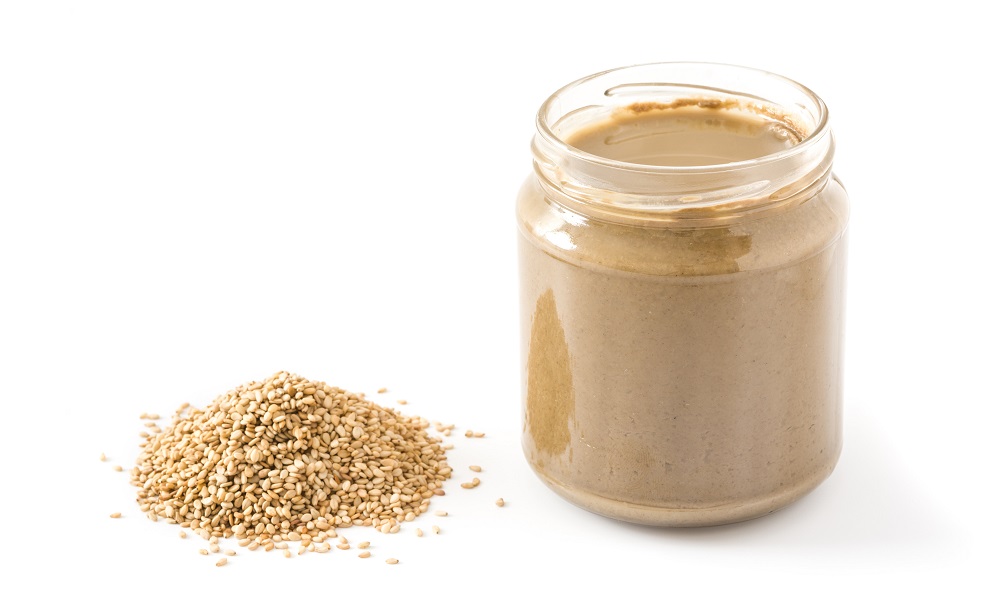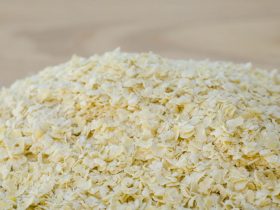Tahini is a Middle-Eastern originating pureed dish made from mashed up hulled sesame seeds. Primarily acting as an additive to hummus and similar dishes, tahini is best known for having an earthy and nutty flavor1.
Because of the relatively high lipid content that sesame seeds tend to possess2, it is recommended that precautions are taken in order to guard against early spoilage of your tahini. Like most nuts, sesame seeds – and by extension tahini – have a habit of going rancid when colonized by bacteria or otherwise interacting with oxygen.
In the correct conditions and environment, tahini can last for up to a year, though this length of time requires that the tahini never be exposed to open air or bacteria. A more realistic estimate, especially for store-bought tahini, would be six months.
Can Tahini be Stored in the Pantry?
The two primary factors that cause spoilage of food are namely the presence of microorganisms and improper storage in the wrong conditions. When your food is subjected to either or both of these two conditions, it is likely that it will begin to go bad at an accelerated speed.
In the case of storing tahini, it is vitally important to always keep the container it is kept in sealed. Tahini will last for quite some time longer if it were never opened, as even just a few seconds of being exposed to the open air can introduce thousands of bacteria and fungal spores into the tahini.

Apart from ensuring the tahini does not become rife with bacterial and fungal colonies, high heat and humidity will encourage both the development of these colonies as well as alteration of the tahini at a chemical level.
In the field of chemistry, conditions that accelerate or enable a chemical reaction are referred to as catalysts. Extrapolating from this, it can be assumed that storage environments with high heat, high relative humidity and strong sources of light can act as catalysts for the slow break-down of your tahini at a molecular level.
Ensure that the tahini, apart from being tightly sealed, is stored in a cool and dry area of your cupboard or pantry. As sunlight is practically a direct source of heat and light, it is also advisable to keep your container of tahini far away from anywhere it may encounter this.
How Long Does Tahini Last in the Fridge Unopened?
A far more preferable option to simply storing tahini in the pantry, choosing to refrigerate your unopened container of tahini will allow it to last a far longer length of time.
If commercially bought, your tahini should come with a best-by date printed somewhere on the container. The manufacturer is ethically obligated to make a conservative estimate of the tahini’s shelf-life, and as such the printed best-by date should only be taken as a guideline3.
Stored unopened in the fridge, tahini will last up to over twelve months from the day of its production, or several months after its best-by date.
How Long Does Tahini Last in the Fridge Once Opened?
While the previous section of this article was aimed towards containers of tahini that have not yet been exposed to the open air, an important distinction must be made when choosing to store already-opened tahini.
Once exposed to the open air, it is more advisable to refrigerate your tahini instead of leaving it to store on your counter-top or in your pantry.
In order to extend the tahini’s shelf-life for as long as possible, reseal the container as soon as possible, and store it away from any moving air that may be present in the fridge, such as near a vent or fan.
Ideally, placing the container of tahini at the highest part of your fridge will keep it edible for the longest period of time.
Opened containers of tahini will last about as long as twelve months, depending on the exact preservatives added to it during production.
How Long Does Tahini Last in the Freezer?
It is advisable to freeze your tahini should you wish to keep it edible for extended periods of time, though this will require certain steps to be taken in order to ensure that nothing goes wrong as it takes a protracted stay in the freezer.
First, it is wise to note that water, when subjected to freezing temperatures at ordinary pressures, will crystallize and expand near-instantaneously. Despite the lower water content of sesame seeds, tahini will still expand somewhat when frozen.
In order to account for this, it is best to move the tahini from its original container into a freezer-safe bag or resealable plastic container large enough to contain the tahini should it expand.
Apart from accounting for the freezing of water, covering the container with a thin sheet of plastic cling wrap will prevent any excess exposure to air, ensuring that the tahini retains its best quality for a longer period of time.
Stored in the freezer, your tahini will last for an indefinite period of time, so long as it is not thawed and refrozen.
In order to avoid thawing the entire batch of tahini, it is advisable to split the batch over several containers or bags. This will allow you to remove only the required amount when choosing to defrost the tahini.
What to Do if Your Tahini has Separated
Owing to the non-polar nature of most lipid molecules, it is often found that the sesame seed fats have separated from the tahini mixture itself. This will appear as a thin film of grease atop the tahini and a marked loss in flavor for the rest of the tahini.
Simply place the tahini in a blender or food processor in order to reconstitute it. The mechanical pressure and shaking will reincorporate the separated sesame oils into the tahini.
Alternatively, one could manually mix the tahini with a fork, however this is inefficient and time consuming.
The Effects of Freezing on Tahini
While freezing tahini will prevent it from going rancid or otherwise being colonized by microorganisms, it will also likely suffer from mild alterations to its appearance and taste if thawed and then frozen again.
Being a pureed mixture, tahini is not affected texturally by the effects of freezing.
Is Storing Store-Bought Tahini the same as Home-Made Tahini?
As commercially manufactured tahini is geared towards long shelf-lives so as to allow the maximum amount of profit to be made, it is common industry practice to introduce additives to the tahini such as preservatives and excess salt. Apart from additives, commercially produced tahini is also subjected to various sterilization techniques that most home cooks cannot replicate.
Because of this fact, home-made tahini will not last anywhere near the same length as tahini that has been purchased from a store. A good estimate on whether your home-made tahini will last very long is the exact method of storage you have chosen to utilize.
If refrigerated and never opened after cooking, tahini will last for as long as a week.
References
1. “Tahini | Definition of Tahini by Oxford Dictionary on Lexico.com also meaning of Tahini”. Lexico Dictionaries
2. Unknown Author. (January 2019) “Seeds, sesame seeds, whole, dried” U.S. Department of Agriculture FoodData Central
3. Unknown Author. (n.d.) “Food Product Dating” U.S. Department of Agriculture Food Safety and Inspection Service https://www.fsis.usda.gov/food-safety/safe-food-handling-and-preparation/food-safety-basics/food-product-dating





Hi, I'm Dom
Dom Eats was started to help other people fall in love with food. While cooking can feel intimidating, it doesn't have to be.